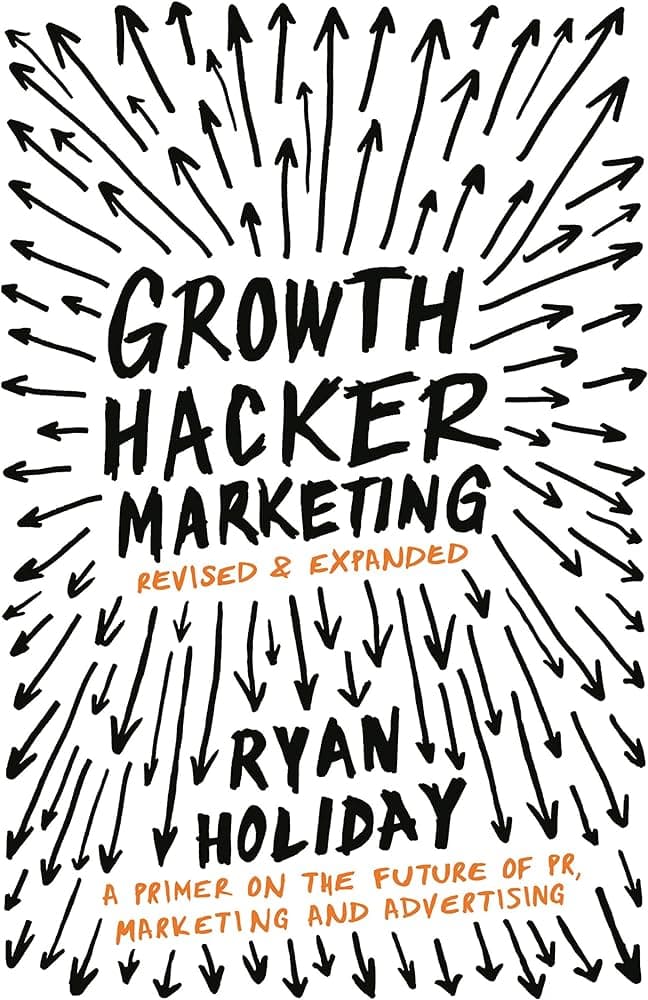Growth Hacker Marketing - Summary and review

🚀 Summary: Growth Hacker Marketing in 30 seconds

Contents
The three main takeaways
Marketing for startups today is different than it was 20 years ago. New terms like “Growth hacking” and “Growth hack” has been coined by startups looking to grow fast and street-smart. A growth hacker refers to “a results-focused marketer with an obsessive fixation on growth”.
Ryan Holiday argues that growth hacking will become the central concern for all marketers in the future. Growth hacking is about finding innovative and unfair ways to grow on a budget, bypassing traditional marketing channels. The area has been popularized by legendary companies like Uber, Amazon, Dropbox, Slack, and Instagram.
1. Nail PMF 📌
Shape your product so it fits with market needs and solves a big painful problem for your ideal customers.Don’t start with the product. Instead, Holiday suggests starting with 1. writing the press release, then 2. writing the FAQ, and then at last 3. building a testable MVP.This will ensure you will be super market-oriented, and not miss your target by focusing too much on building out an advanced product without a clear need.
2. Be hyper-specific in targeting - find your growth hacks 🎯
Growth is all about targeting the right people.Often companies target way too wide, trying to cater to everyone, or have an unclear picture of WHO their ideal customer is.
Don’t try to sell to everyone
Target a small, but highly specific group of people, who are a perfect fit. This means you can spend more time getting to know what their pains are, how to create value for them, and build on the valuable feedback you collect.Otherwise, you will end up with content that does not cater to anyone, eventually leading to a product that is developed in a direction that is perfect for no one.
The Dropbox case - A niched growth hacking effort
Background:
Digg was a huge community back in 2008, attracting over 236 million annually. On the website, people could vote on social news content, either up or down, called digging and burying.
What Dropbox did:
Drew Houston, the co-founder of Dropbox, recorded a demo video to show how the product worked. In this video, he included very specific nuggets that only would be recognized by the Digg community.
Results:
In less than 24 hours, the video had 10,000 Diggs. This drove several 100K people to Dropbox’s site, which in turn resulted in their waiting list growing from 5K to 75K. Overnight!
3. Turn your customers into marketers - let your users spread the word 🚀
Virality is about scalable and exponential growth. Ryan Holiday suggests two ways to make viral growth for a product happen:
Make it shareable
Tell your users to share
By providing incentives to share, and make the friction of sharing minimal - the customers can do the work for you.
How Dropbox did it: get more space by inviting your friends (more of product)
How Appsumo did it: get $10 credit when user signs up via referral link (financial)
How Apple dit it: get stickers with each product and make their designs stand out - eg. Airpods are white, unique and visible (visual)
Growth Hacker Marketing review - what kind of book is it?
Good short overview and intro to the topic of growth. A bit basic at times, but great references to timeless stories and experiments from companies like Hotmail, Dropbox, Appsumo and Apple. Wanted to have more depth and a red thread to follow.
Frequently asked questions (FAQs)
Q: Who is Ryan Holiday?
Ryan Holiday is a best-selling author, media strategist, and entrepreneur. When he was 19 years old, he dropped out of college to apprentice under Robert Greene, author of The 48 Laws of Power. He is the author of 10 books on practical philosophy and has worked with companies such as Google and American Apparel. Holiday is also the founder of Brass Check, a marketing agency, and the editor-at-large of Thought Catalog.
Q: Is the Growth Hacker Marketing available as PDF?
If you (A) think the summary of Growth Hacker Marketing above is not enough, or (B) the summary makes you crave the full book - you can also find the PDF or Epub versions at Amazon, or your nearest bookstore.
Want to learn more about growing SaaS companies?

